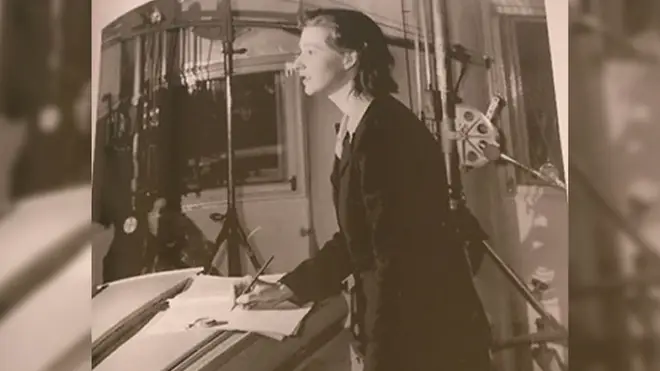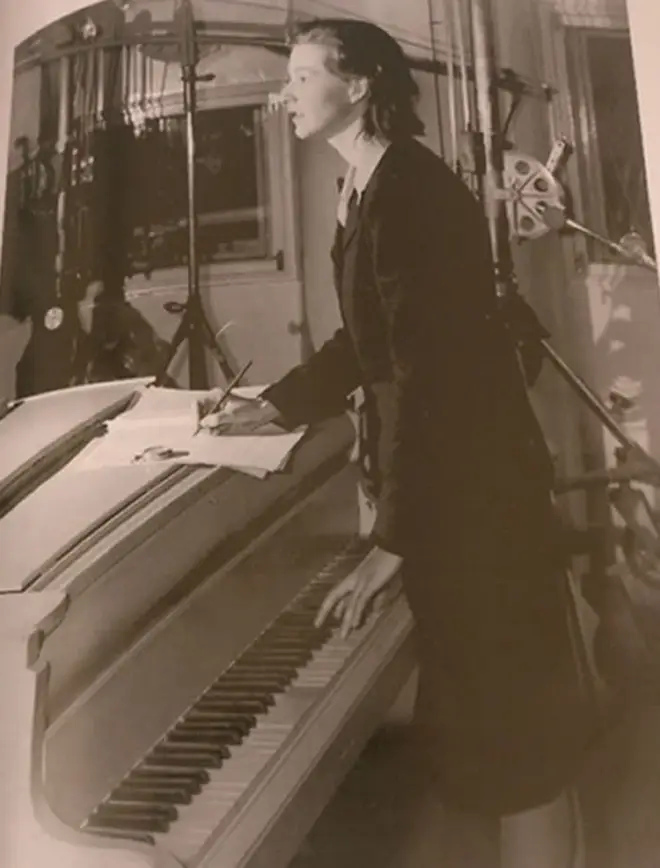On Air Now
Calm Classics with Ritula Shah 10pm - 1am
29 June 2022, 16:05

2022 is the centenary year of Doreen Carwithen, the trailblazing music figure who became known as the world’s first full-time female film composer.
In 1946, Doreen Carwithen – also known as Mary Alwyn – became the first woman anywhere in the world to work full-time as a film composer. And in 2022, her centenary year, she will be celebrated in a new festival dedicated to her life and music.
Born 100 years ago in Haddenham, Buckinghamshire, Doreen was first introduced to music through her mother, an aspiring concert pianist. After dabbling in composition as a teenager, Doreen entered the Royal Academy of Music in 1941, where she studied under the English composer and conductor, William Alwyn.
Her first orchestral work, the overture ODTAA (One Damn Thing After Another), had its premiere at the Royal Opera House in 1947, and was a roaring success. Critics of the 1940s were stunned – surprised not only to see a young composer making their mark with a debut orchestral work, but a young woman.
Doreen went on to write more than 30 films in the late 1940s and 1950s, many of which were shot at the prestigious Denham Film Studios, home to Brief Encounter and Great Expectations.
She quickly gained a reputation in the film industry for her ability to work calmly and quickly under pressure; her score for the official film of the coronation of Queen Elizabeth II in 1953 had to be completed within the space of a week.
Read more: Google Doodle celebrates legendary Black British composer Amanda Aldridge

ODTAA (One Damn Thing After Another)
“She was a female composer working in a man’s world,” says Mark Chivers, viola player and artistic director of the Carwithen Music Festival, which takes place in what would have been Doreen’s 100th birthday year.
“I discovered quite by accident that her centenary was coming up,” Chivers adds in a promo video for the festival. Stripped of all concert dates during the pandemic, the violist was unable to perform, and instead used his time to think about how he could celebrate Doreen’s life and her music.
Chivers eventually settled on the idea of a weekend festival in her birthplace, Haddenham. Beginning on 30 June and continuing across a four-day weekend, the Carwithen Music Festival will feature the composer’s film scores (Mantrap, Boys in Brown) specially arranged for string quartet, her Violin Sonata performed by violinist Fenella Humphreys, plus a new commission from Poirot composer Christopher Gunning, who once lived in the old school building where Doreen Carwithen went to school.
“There seems to be a common thread with Doreen Carwithen,” said cellist Nick Stringfellow, who will appear at the weekend’s festival. “Every time you uncover something or research something, there’s an amazing connection with either another person, another area or another composer.
“And that’s very much the spirit of this festival – so you’ve got lots of influences and connections colliding.”
Read more: Meet the composer who became the first openly transgender Oscar nominee

One such connection involves one of today’s biggest pop stars. Doreen, also known by her married name Mary Alwyn, is the step great-grandmother of English actor Joe Alwyn, the long-term partner of American singer-songwriter Taylor Swift.
William Alwyn, Joe’s great-grandfather, was a composer and conductor. He met Doreen as her teacher at the Royal Academy of Music. Years later, they had a 16-year affair while William was still married to his first wife, Olive Pull.
Doreen and William eventually married and, the former not being too fond of her first name, changed her name to Mary Alwyn.

Carwithen Music Festival Promo
Debbie Wiseman, Classic FM’s Composer in Residence and the President of the festival, said: “I first discovered Doreen’s music through her film music – I was made aware of Mantrap, Boys in Brown, those film scores that were hugely successful scores, I felt. They were melodic, great movie themes, powerful, beautifully orchestrated, very dramatic – and I was drawn to them.
“And the more I listen to the music, the more I enjoy it [and] find subtleties in it. I love the mix of Walton and Stravinsky, a little bit of Vaughan Williams, all those influences are there, and yet she delivers the music in her own voice very successfully.”
Over the weekend, Debbie will be unveiling a blue plaque in her birthplace, bringing the name of the trailblazing composer to a wider audience.

Debbie Wiseman on women writing film music
Decades on, women film composers are slowly beginning to occupy more space in what has historically been a male-dominated industry. In 1997, Rachel Portman became the first female composer to win an Oscar in the category of Best Musical or Comedy Score. A year later, Anne Dudley took the award – but it wasn’t until 2020 that a woman won in the category again, with Icelandic composer Hildur Guðnadóttir scooping the prize for her Joker score.
“Doreen’s legacy as a woman working in a man’s world is considerable,” Chivers adds. “She paved the way for today’s female film composers.”
Carwithen’s centenary is “a landmark in music history that we should be celebrating”, adds Wiseman, who is one of today’s leading film and TV composers with more than 200 scores under her belt. “Yes you can have a career now as a woman, as a film composer. There are no limits now – there are no restrictions to the possibilities of your career.”